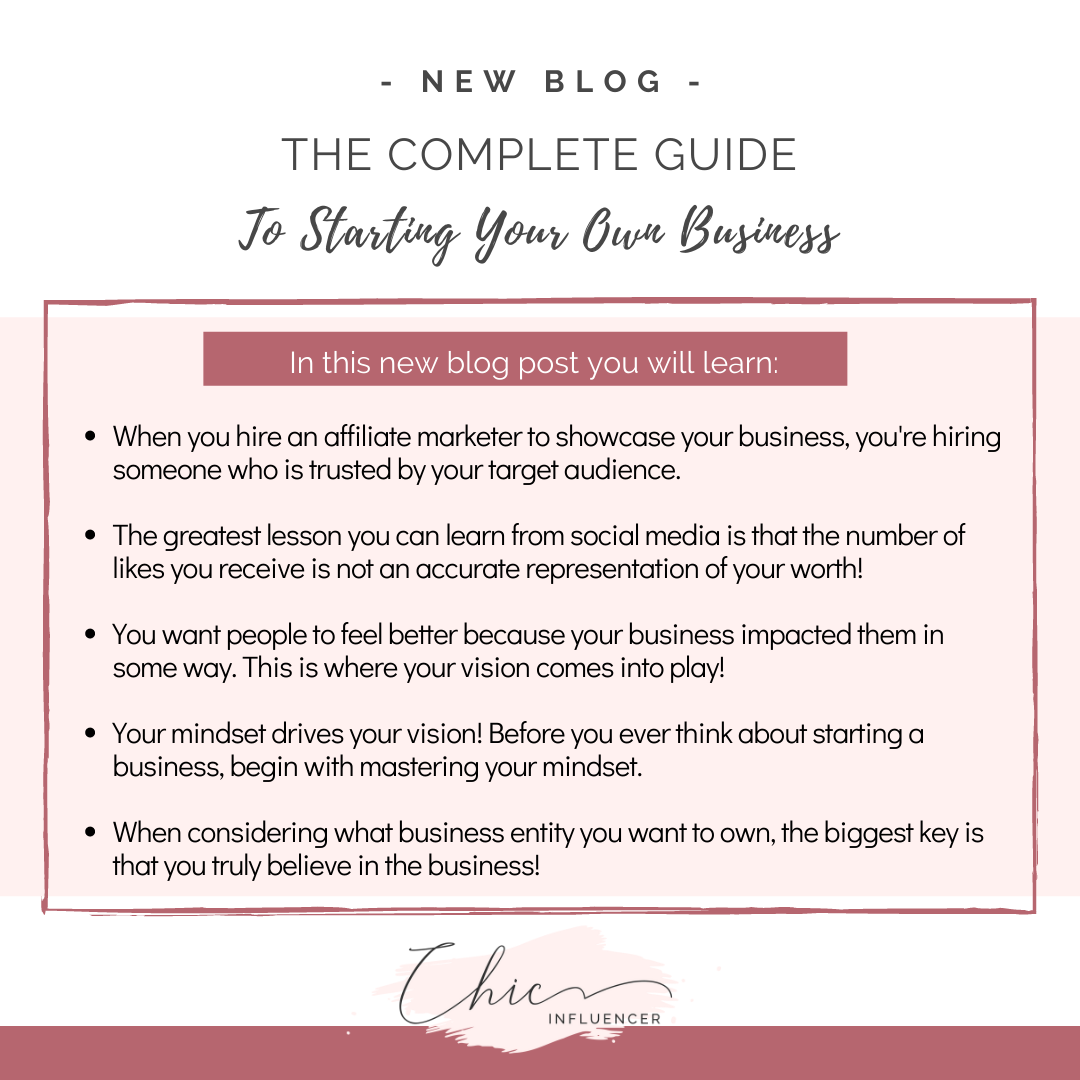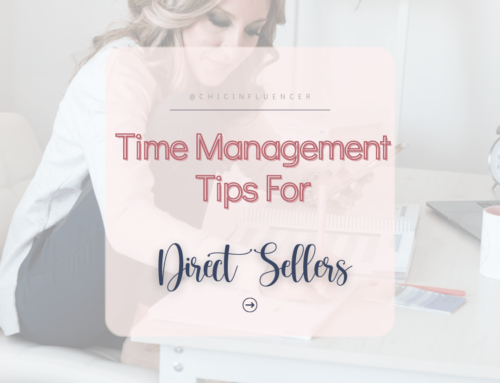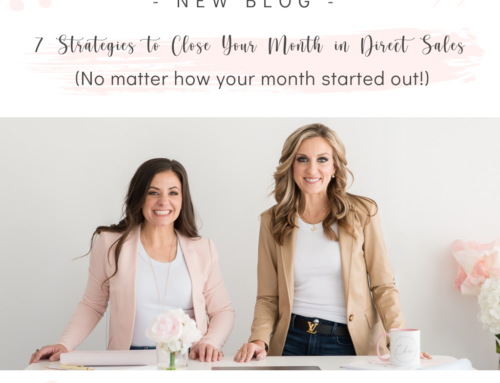The Complete Guide to Starting Your Own Business
Last month, we hosted the Virtual Small Business Summit. Eight speakers laid out the complete guide to starting your own business. We created this Summit for people who:
”feel stuck”
“have no other option”
“feel forced to make decisions they’re uncomfortable with”
or people who…
“Have an idea but no idea how to turn that idea into profit”
“Find themselves waiting for the right time”
“Simply crave more”
We covered topics from finances, creating a business plan, social media marketing, business considerations, affiliate marketing, and the legal aspects of starting a business. Today, we’ll summarize the key points from the Summit in case you weren’t able to make it. This information is critical to starting your own business or scaling your current business!
Business Considerations
First, before you ever start your own business, the first step is figuring out what type of business you want. There are three different types of business entities you can own:
-Creating Your Own Business: This type of business starts from an idea that turns into a product, service or experience. You take the thing you passionately created and turn it into a business.
-Franchise: This business model is simple because you know the business model works. The framework is already there, so you choose to buy into the franchise.
-Network Marketing: An example of this business entity is direct sales. While direct sales does get a bad wrap, it is 100% a real business.
When considering what business entity you want to own, the biggest key is that you truly believe in the business! Starting a business is not a quick road to success! It is hard work and late nights. So you must, without a shadow of a doubt be passionate and believe in the service, experience, or product you create! If you don’t, you will not take action, be fearful, and will ultimately fail. Start a business that you can persevere through! It’s tough work, so passion is critical!
Financial Aspects
Next, let’s discuss the financial aspects of starting your own business. Money is one of the biggest factors that keeps people from starting their own business. Trying to figure out how much money you’ll have to make in order to keep your business afloat can be tough. Managing your money so that you can succeed takes discipline and strategy. Start by breaking down your bills into three categories: Fixed and Reoccurring Bills, Day to Day Spending, and Non-Reoccurring Whammies.
Let’s Breakdown the Process!
First, start by writing down all of your fixed and reoccurring bills. Then divide your bills by date not by category. On an excel sheet, write down each payday date and then the bills that will be due from that paycheck. This will help you see a timeline between your checks and bills. You’ll clearly be able to see how much you’re profiting and spending from each individual paycheck.
Next, for your day to day spending, create a separate checking account. If you have your personal expenses and business expenses coming out of one account, it can be very confusing to keep up with the amount of expenses and revenue your business is projecting. Keeping things separated allows everything to be clear and leaves no room for questions as to what your business can do.
Last, your whammies are the non-reoccurring expenses that come up yearly or quarterly. With non-reoccurring expenses, it can be hard to estimate since every month is different. So how do you prepare for your whammies? Write down roughly how much each whammy will cost you per a year. Then divide that number by 12! This is how much you should be setting aside in a savings account each month, so that when the whammy comes- you already have the funds to pay for it!
Setting up your finances like this will give you the clear picture for your business numbers. Now you can easily see what your business can and cannot do, allowing you to plan for the future and set goals for your business.
Affiliate Marketing
Affiliate Marketing has become a super popular and effective way to market your products or services to a multitude of people for the fraction of the cost. When you’re wanting to market your product or service, start by reaching out to an affiliate marketer. An affiliate marketer then markets the businesses product or service with their online social media, email list, or website.
The reason affiliate marketing works so well is because people trust the opinions of their friends. You trust your friends recommendations on amazing products, delicious restaurants, thrilling experiences. When you hire an affiliate marketer to showcase your business, you’re hiring someone who is trusted by your target audience. It works super well, and it costs you a lot less than running ads or using more traditional forms of marketing.
Most of the time, the affiliate marketer is given free product, compensation, or a commission of what they sell. And sometimes they receive all of the above! However, both the business owner and the affiliate benefit from the exchange. The business owner is able to market their business for a fraction of the cost, while the affiliate earns an income marketing something they truly love and support!
Social Media Marketing
For most business owners, social media feels like a huge question mark. Where do you begin? How do you scale using social media? How do you get your audience to engage?
There are so many questions about how to make social media work for your business. The first thing you have to ask yourself is: where is your audience spending most of their time? Take some time thinking about your target audience. Are they on Instagram, Facebook, Tiktok? If you’re just getting starting with social media, start by mastering one social media platform before trying your hand at all of them. As you learn your way around one, then begin to master another!
When starting your business, you want to optimize your profile on socials. Think of your socials as the window display of your business. What are the best parts of your business you want to feature? You want to make it easy for people to see what you do well! Make a post introducing your business, how you got started, and the mission behind what you do! People enjoy seeing the person behind the business, so make it personal.
Before posting, ask yourself these few questions:
-Does your image and the first few sentences of your caption encourage people to keep reading?
-Did you connect with your audience on a personal level?
-Are you adding value with this post?
-Did you add a call to action at the end of your caption? You always want to tell your audience what to do next with the information you’ve given them!
The greatest lesson you can learn from social media is that the number of likes you receive is not an accurate representation of your worth!
Business Plan
It’s essential that you have a business plan before starting your own business. Having one is important, but understanding WHY you are doing it is even more critical. When you have a vision and a mission for your business, you will automatically be set a part from the crowd. You aren’t hoping something great stumbles upon you and your business. You aren’t crossing your fingers for success. You have a plan, and it’s not a matter of if you become successful but when you become successful.
There are 6 key factors for a great marketing strategy:
- Identify Your Ideal Client: Who are your customers?
- Identify Your Sales Strategy: How are you going to sell your product/service?
- Identify Your Marketing: Are you advertising already? When you have more funds, where will you advertise?
- Identify Your Distribution: Do you freelance, sell directly to customers, online, to a vendor?
- Identify Your Competition: Who are your direct/indirect competitors? What is your advantage?
- Identify Your Brand: What image will you project? How do you want people to feel when they come to your or your website?
Identifying your ideal client is first and foremost for starting your own business. Identifying who they are and what problem you resolve for them is the first steps for any business plan. You want people to feel better because your business impacted them in some way. This is where your vision comes into play!
Legal Structures
There are four legal structures you should consider before starting your own business:
- Sole Proprietorship: This type of legal structure is set up for one person. The cost is relatively low when starting a Sole Proprietorship. The negative is that you have personal liability to the debts of the business.
- Partnership: This type of legal structure is set up for two or more individuals who want to start a business together. There are two types of Partnerships: General Partnerships and Limited Partnerships. General Partnerships are set up so everyone within the business has joint, equal responsibilities of the liabilities, debts, and finances of the business. If you have a Limited Partnership then you have limited liability, so you won’t be liable if the business goes under.
- Limited Liability Company: This type of business structure is set up so the owners are protected from personal responsibility for its debts and liabilities.
- Corporation: This type of business structure is an organization, usually a company or group of owners. A corporation is a completely separate entity from its owners.
It is so important when starting your business to consider the legal structure so that you can protect yourself. You should find an attorney who can walk you through this process in more detail. While attorneys can be expensive, the cost of not protecting yourself could be a lot higher if things go south in your business.
Successful Mindset
Last, we discuss how to master your mindset for success. Here are four keys to help you master your mindset:
- Review: If you are not doing well, ask yourself how you got here? If you are doing great, again- ask yourself what brought you to this place? When you take a step back and evaluate your mindset, that is when you can move forward!
- Identify: What is holding you back? What are you afraid of? Naming the thing that is holding you back allows you to take back the power of it. You can’t conquer something you cannot name, so name it!
- Speak: How are you speaking to yourself? At Chic Influencer, we talk a lot about our narratives! How you speak to yourself will determine the mindset you have. Start telling yourself the things you are doing great! The same energy you use to speak negatively about yourself, use it to say something positive.
- Effect: Look at the your review, identify, and speak questions. How are all of these things impacting you? Are you becoming a better business owner?
Your mindset drives your vision! Before you ever think about starting a business, begin with mastering your mindset. The road to success is challenging, and it’s easy to give up. Mastering your mindset will push you to persevere and keep going!
Want to learn more about starting your own business?
Start by listening to this week’s podcast episode: Behind the Scenes of Starting Your Own Business.
You can read about shifting your business mindset HERE!






